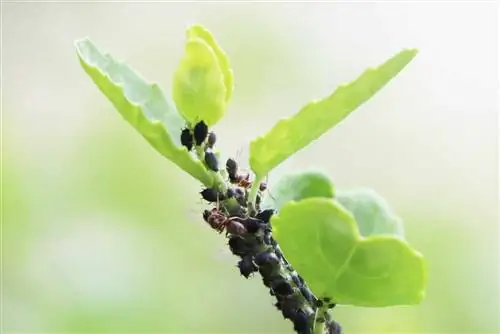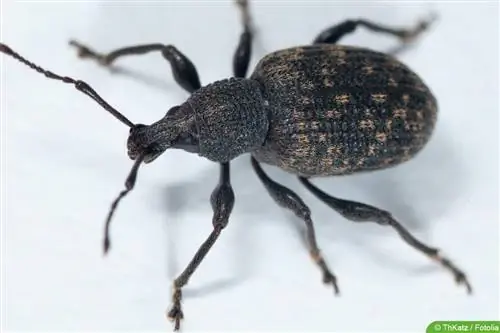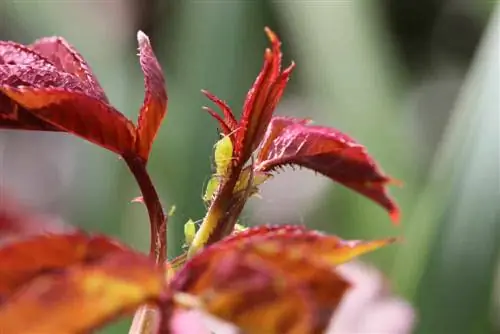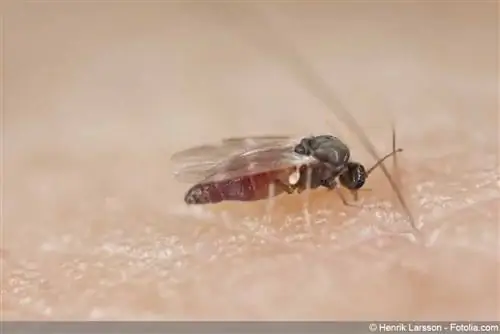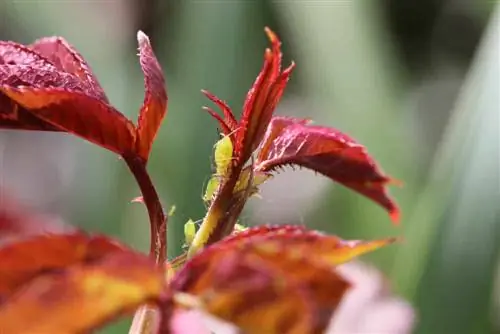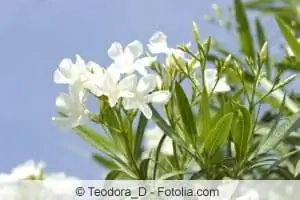- Author admin caroline@plants-knowledge.com.
- Public 2023-12-17 03:39.
- Last modified 2025-01-24 12:45.
Black aphids are not only disgusting, they also pose a danger to garden and house plants. A plant does not necessarily have to die from an aphid infestation, but you shouldn't risk it either. Immediate action is required. Because: If the infestation is recognized in time, the pests can be combated quite effectively with proven home remedies. There is no need for insecticides. This protects the plant itself and of course the environment. Plus it saves money. This can be used to effectively combat black aphids:
Pure water and water jet
The easiest way to combat aphids is ordinary tap water. With it, the animals can be washed from the plants, so to speak. Of course, this works best when used in combination with a water jet. The pressure behind the jet literally washes the little pests off the leaves and stems. Outdoors you should use a garden hose with a spray attachment. In the apartment, the shower or bathtub spray is suitable. However, the pressure should not be too strong so as not to injure the plant itself. It is also important that as little water as possible gets into the ground. To avoid this, either hold the plant at an angle or put the plant pot in a plastic bag that is tied at the stem. Of course, the water jet method only works at a very early stage, when the aphid infestation is still low.
Tip:
All plants outdoors or indoors should be checked regularly for infestation with aphids or other pests. A rhythm of two to three days is recommended. It is important to also look at the undersides of the leaves and the stems. The following applies: the earlier an infestation is detected, the easier it is to combat.
Soap suds
If spraying with a water jet no longer helps, you will inevitably have to resort to harsher measures. The main option here is to treat the plant with soapy water. However, you should not use the standard soap from the supermarket, but rather soft soap. This type of soap is a completely natural product that does not contain any chemical additives such as fragrances. You proceed as follows:
- The lye is mixed with a tablespoon of soft soap in one liter of water until the soap has completely dissolved
- To intensify the effect even further, a small splash of spirit can be added
- The resulting solution or lye is put into a spray bottle and sprayed all over the plant until it is really dripping
- The underside of the leaf should not be forgotten, as aphids prefer to stay here
- Let the solution take effect and, if necessary, rinse with clean water after a few hours
With such a mixture of soapy water and alcohol you can literally kill the black aphids on the plant. The solution forms a fine film under which the animals suffocate without damaging the plant. When it comes to aphid control, it is one of the most effective means. The effectiveness of soapy water is demonstrated not least by the fact that manufacturers now offer ready-made solutions that just need to be applied. However, it is much cheaper to simply mix the lye yourself.
Dishwashing liquid, rapeseed oil and milk
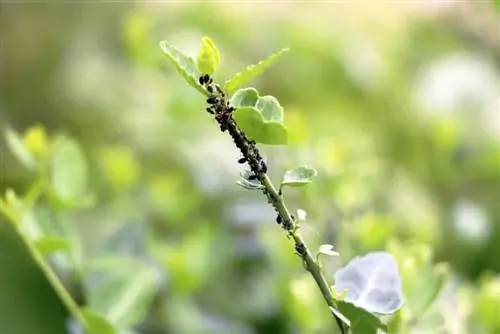
If you don't have soft soap on hand, you can also mix up a solution to combat black aphids using dishwashing liquid, rapeseed oil and milk. A mixture of rapeseed oil and dishwashing liquid has proven to be extremely effective:
- For a medium-sized plant, mix around 90 milliliters of rapeseed oil with five liters of water and add a few squirts of dishwashing liquid
- Stir well several times
- Pour the solution back into a spray bottle and spray the plant intensively from all sides
- Don't forget the undersides of the leaves, leaf bases and shoots
The whole thing works similarly with milk. Here you make a solution of 100 milliliters of milk and 200 milliliters of water, which you then spray the affected plant with until it drips. Both methods cause the aphids to die. However, the process may have to be repeated after a few days because not all animals could be reached. After treatment, the plant must therefore be checked intensively. By the way, a pure detergent solution would also work. For half a liter of water, around five milliliters of dishwashing liquid is enough.
Nettle and Tobacco
If you don't like the aphid control methods presented so far, you can also make a highly effective decoction of nettles or tobacco or cigarette residue. To prepare the nettle broth, one part of nettles is mixed with ten parts of boiling water. The nettles then have to steep in the water for a good two days. Heat is no longer necessary. After these two days, the leaves are removed, the broth is poured into the spray bottle and the plant is again generously sprayed with the solution. It is important that there is no direct sunlight. In combination with the brew, this can cause ugly brown spots on the leaves. So it's a good idea to work in the shade.
Nicotine is a very effective and completely natural poison for combating all kinds of plant pests. To get it, simply boil leftover cigarettes and tobacco until a brown broth is created. This is then poured over a cloth or very fine mesh sieve to remove any solids. The spray bottle is used again.
Natural predators
Yes, black aphids also have enemies in nature that they serve as food. This is referred to as so-called predators. The most famous of these is the ladybug. In a he althy outdoor ecosystem, the population of ladybugs will automatically ensure that aphids do not proliferate excessively. A ladybug eats around 4,000 aphids over the course of its short life of about a month. In comparison, the beetle larvae number an impressive 800 specimens. It's just a shame that ladybugs are becoming increasingly rare in nature and also don't settle in homes.
If you still want to combat black aphids in this truly organic way, you can buy the small beetles from specialist retailers and place them on the affected plants. They are available in different denominations in small doses.
Tip:
Put four or five ladybugs in a small paper bag and then carefully attach it to the plant with a clothespin. The animals free themselves and go hunting for the aphids.
Alternatively, you can of course look for ladybugs in the garden, catch them and then bring them into your apartment. However, this is not recommended. Firstly, it is quite a laborious task and secondly, the animals are then missing out in nature. The ladybug method is something for specialists or botanists.
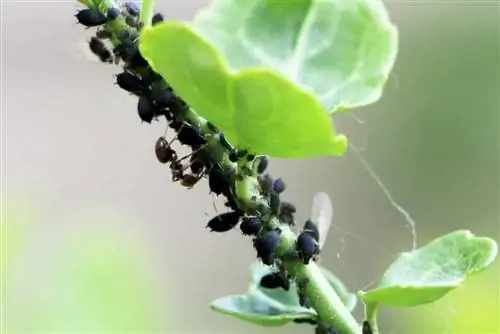
There is no question that black aphids can be easily controlled without any chemicals or insecticides. Which of the aphid control methods presented here you choose depends, of course, on your own sensitivities. The top tip is and remains the soapy water made from soft soap. A truly effective means of permanently destroying aphids cannot be produced more easily or quickly. The application is very easy. The lye also protects the plant itself and practically all beneficial animals. In short: soapy water is the method of choice for aphid control.
Preparing a nettle or tobacco decoction is significantly more complex in comparison. The tobacco brew also has the disadvantage that it smells very unpleasant and is therefore hardly suitable for use in closed rooms. At least you can dispose of tobacco and cigarette residues sensibly - provided you have a smoker in the family. If you want to rely entirely on a natural ecosystem in your home, ladybugs are strongly recommended. However, this also involves effort and costs. You shouldn't forget that the little crawlers have to be bought constantly.
Conclusion
As already mentioned, the same applies to aphid control: ward off the beginnings. Always keeping an eye on your plants and checking them regularly for possible pest infestation is the best precaution. It is particularly important to take a close look at the undersides of the leaves and the shoots. When uninvited guests first appear, you should immediately take countermeasures with a water shower to prevent anything worse from happening. An aphid infestation is by no means a death sentence for a plant. It can easily survive a dead leaf or brown leaf tips. If detected in time, fighting the little beasts is no problem and can even be achieved by inexperienced plant lovers.

